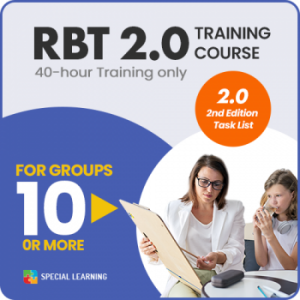There are numerous therapies dedicated to improving the communication, cognitive, and motor skills of children with autism. As the child progresses in developing and enhancing these skills, parents and caregivers alike should not forget that therapies should also be fun. Keeping the therapies light and stress-free accommodates the child’s learning all the better.
One form of therapy for a child with a developmental disability is sports. Allowing the child to participate in fun games will pave the way for new life experiences and at the same time further enrich motor, communication, and coordination skills. But not all sports games can be beneficial to a child with autism. Parents and caregivers should always be careful as to which sports to encourage.
In choosing what sports the child should be exposed to, here are some pointers:

RBT 2.0 Online Training Course
PRICE: $99.00 $79.00

Building Language for Early Learners Bundle
PRICE: $79.00
An example would be a child’s involvement in karate lessons. The different steps or poses to be learned can be seen as routines in the sense that the child would do the same steps over and over again, usually at the same time and in the same order.
Children with autism can sometimes be irritable and develop hypersensitivity to noise and touch interaction. These things may lead them to be aggressively defensive or throw tantrums. Letting the karate instructor know about these and other risks can aid in his or her therapy.
References:
Sport and Dev. sportanddev.org Sport in the United Nations Convention on the Rights of Persons with Disabilities. Retrieved August 31, 2001, from http://assets.sportanddev.org/downloads/34__sport_in_the_united_nations_convention_on_the_rights_of_persons_with_disabilities.pdfn the United Nations
Copyright © by Special Learning Inc. All right reserved.
No part of this article may be reproduced in any manner whatsoever without written permission except in the case of brief quotations embodied in critical articles and reviews. For information, contact Special Learning Inc., at: contact@special-learning.com
Parent Waitlist Program
November 02, 2023 | 12pm-1pm PDT

Being an RBT for me was extremely fun because where were you going to find a place where you can be completely silly without having to worry what people thought about you? This was the only job that made me feel like I could make a dramatic difference while being myself.
I also liked to be surrounded by people that had the same goals of wanting to help kids and the teamwork made the job much easier and more enjoyable.
Change and progress was the ultimate goal for our kiddos. The early intervention program was seriously only a miracle because I saw changes in the kiddos that from day one, you wouldn’t even recognize who they were.
Changes from being able to utter 3-4 words where they can only make a syllable from when they started, the behavior decreases in which kiddo that used to engage in 30-40 0 self-harm to only half, learning how to wait during games, table work where they use to swipe and drop to the floor if they had to.
My favorite was when the parents would tell us what amazing progress they were making at home. I used to tear up and felt for these parents so much because it was already difficult for them and now, they can trust and rely on ABA and the therapists knowing their goal was ours.
By Emma Rogers, BA, RBT

This is an independent SL Hotline that is part of our VCAT service. This hotline has no connection with any other association or membership group.
Got a question you want a BCBA or other ABA expert to answer?
Fill in this form and one of our professionals will handle your question quickly and confidently. You can expect a response in 24-hours or less.